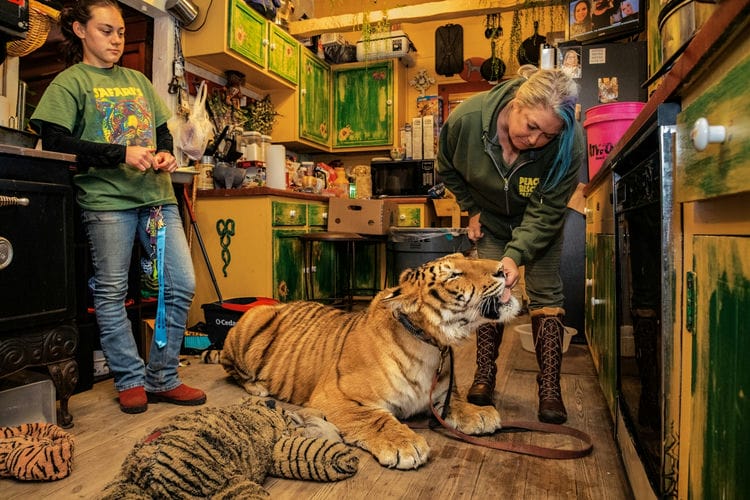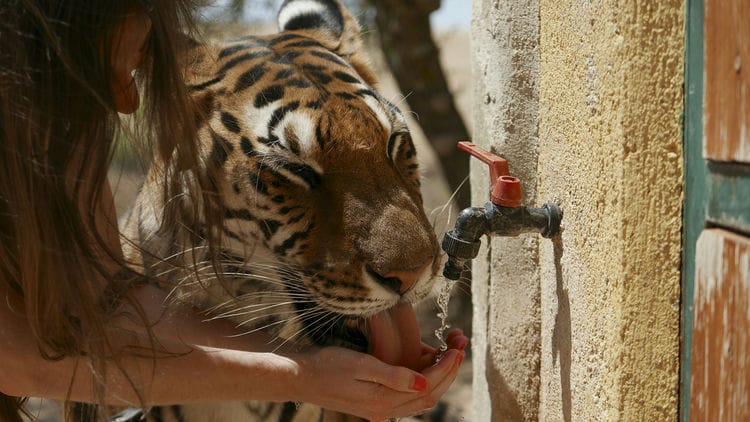MOVIE & LIFESTYLE NEWS
Can Tigers Be Domesticated? Understanding the Challenges of Keeping Wild Cats as Pets
Tigers, with their majestic appearance and powerful presence, are one of the most captivating animals in the world. However, can tigers be domesticated? This question raises significant concerns about safety, ethics, and conservation. In this article, we explore the risks and challenges of domestication and the reasons why tigers should not be kept as pets with AlibayTrendy Store now
Understanding Domestication
Domestication is a complex and gradual process that can take hundreds, if not thousands, of generations to accomplish. This process involves carefully selecting animals with specific traits that are desirable for cohabitation with humans, such as a gentle temperament, tolerance for confinement, and a lesser propensity for aggression.

Over time, these animals undergo genetic changes that lead to domesticated species—animals that are not only comfortable around humans but also reliant on them for food, shelter, and care. The process is not just about taming wild animals; it’s about creating a symbiotic relationship where both the animal and human benefit from the interaction.
Dogs and cats are prime examples of successful domestication. These species have been selectively bred to adapt to human environments, and their behaviors are aligned with human lifestyles. As a result, they exhibit traits like loyalty, companionship, and even a sense of playfulness, which makes them suitable as pets in homes around the world.
Can Tigers Be Domesticated?
Tigers, with their powerful physique and striking patterns, captivate the imagination of many, but they are fundamentally different from domesticated animals. Despite their stunning appearance, these majestic creatures are not meant to live in human environments.

Tigers have evolved over millions of years to become apex predators, equipped with sharp claws, massive teeth, and the raw strength to hunt and defend their territory. These physical attributes are complemented by instinctual behaviors that help them survive in the wild. Tigers are naturally solitary, preferring vast territories where they can roam and hunt without interference.
Their aggressive tendencies and unpredictable nature make them a danger to humans, even to those who may have raised them from birth. In the wild, tigers have complex social structures, with specific territories, hunting patterns, and mating rituals that don’t align with the concept of domestication. Thus, while they can be trained or tamed to a certain extent, they retain their wild instincts and cannot truly be domesticated.
The Risks of Keeping Tigers as Pets
Keeping a tiger as a pet is a dangerous endeavor that can result in severe harm or even death for the owner and others around them. Tigers are apex predators, designed by nature to hunt and protect their territory with brute force.

Even those who believe they have formed a strong bond with a tiger can be at risk, as these animals retain their wild instincts and can become aggressive without warning. Tigers have powerful jaws and sharp claws, capable of inflicting life-threatening injuries. A playful swipe from a tiger can cause deep lacerations, and a single bite can be fatal.
Additionally, tigers require highly specialized care that goes beyond what the average pet owner can provide. They need large enclosures that replicate their natural habitat, allowing them to roam and exercise.
Without adequate space, tigers can become stressed and more aggressive. Tigers also need a carefully balanced diet, which consists of large quantities of raw meat. The cost of feeding a tiger is substantial, and improper nutrition can lead to health issues.
Veterinary care for tigers is another major challenge; it requires expertise in exotic animals, which is costly and not readily available in many areas. The lack of appropriate care can result in poor health, behavioral problems, and even the death of the animal.
Legal and Ethical Concerns
From a legal perspective, owning a tiger as a pet is restricted or outright illegal in many regions due to the inherent dangers and ethical issues. Governments and wildlife protection agencies have established strict regulations to prevent individuals from keeping dangerous wild animals in residential settings.

These laws are in place to protect both the public and the animals themselves. The trade in exotic animals like tigers is often tied to illegal activities such as poaching, smuggling, and unregulated breeding. By purchasing a tiger, individuals may inadvertently support these illicit practices, contributing to the decline of wild tiger populations.
Ethically, keeping a tiger in captivity raises significant concerns. Tigers in the wild roam vast territories, hunt, and engage in complex social behaviors. Confining them to small spaces and denying them the opportunity to exhibit their natural behaviors can lead to stress, anxiety, and aggression.
Moreover, the improper care of these animals can lead to suffering, with inadequate nutrition, poor living conditions, and a lack of social interaction contributing to their decline. Supporting the exotic animal trade by keeping tigers as pets undermines conservation efforts and perpetuates the mistreatment of these magnificent creatures.
Alternatives to Domestication
If you’re fascinated by tigers and want to experience their beauty up close, there are safer and more ethical ways to appreciate these magnificent creatures without resorting to domestication. One of the best ways to observe tigers is by visiting accredited zoos and wildlife sanctuaries.

These facilities are designed with the animal’s well-being in mind, providing spacious enclosures that mimic their natural habitats. In these settings, tigers have room to roam, climb, and engage in behaviors that are typical in the wild, such as hunting simulations and social interactions with other tigers.
Accredited zoos are subject to strict regulations and standards, ensuring that the animals receive proper care, nutrition, and medical attention. The staff at these institutions are often experts in animal behavior and welfare, offering educational programs that promote conservation and raise awareness about the challenges tigers face in the wild.
Visitors to these zoos can learn about the biology, habits, and conservation efforts related to tigers, fostering a deeper understanding and respect for these animals. Wildlife sanctuaries offer another alternative for experiencing tigers in a more natural setting.
These sanctuaries often focus on rescue and rehabilitation, providing a safe haven for tigers that have been rescued from illegal trade, abusive captivity, or other dangerous situations. By visiting a sanctuary, you support their mission to provide a better life for these tigers while also learning about the impact of human activities on wild tiger populations.
Beyond visiting zoos and sanctuaries, individuals can support conservation organizations that work to protect tigers in the wild. These organizations engage in a variety of activities, from anti-poaching efforts and habitat restoration to community education and research.
By donating to or volunteering with these groups, you can play an active role in ensuring the survival of tigers for future generations. Supporting these organizations helps create a future where tigers can thrive in their natural habitats, free from the threats posed by illegal hunting and habitat destruction.
In conclusion, tigers cannot be domesticated. These wild animals have intricate needs and behaviors that make them unsuitable as pets, and the risks and ethical concerns far outweigh any perceived benefits. To honor these magnificent creatures without attempting domestication, consider supporting their conservation and visiting responsible wildlife facilities.
If you’re a tiger enthusiast and want to show your appreciation in style, check out the Tiger Hawaiian Shirt at AlibayTrendy Store. It’s a fun and vibrant way to celebrate the beauty of tigers while supporting a brand that respects wildlife. Visit AlibayTrendy Store today to find the perfect shirt for your next adventure.
